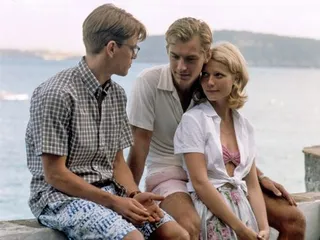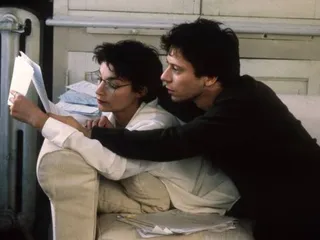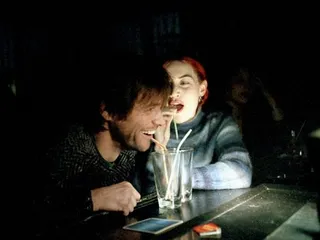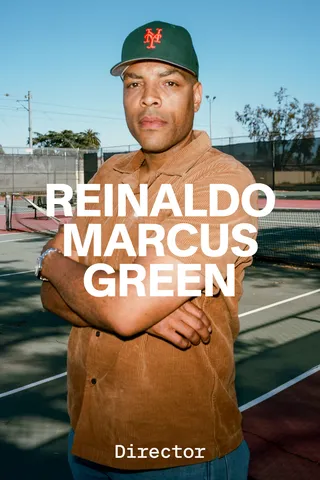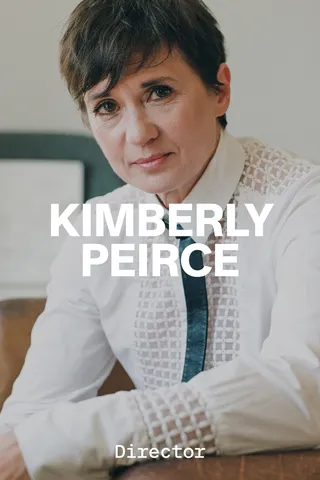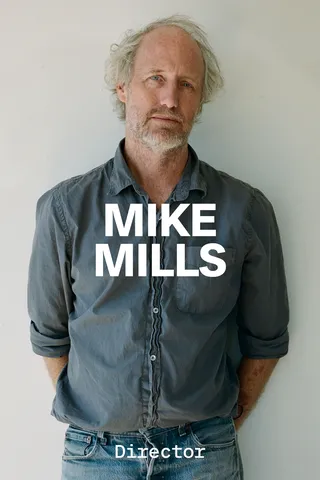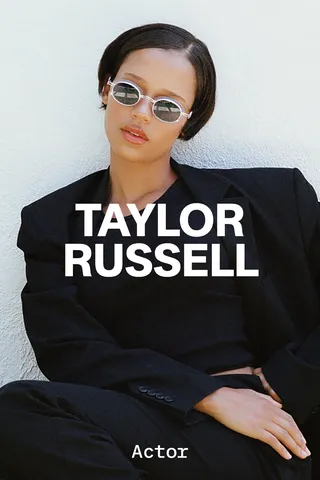Rachel Kushner
Acclaimed author (The Flamethrowers, Telex from Cuba, Creation Lake) and former guest director of the Telluride Film Festival Rachel Kushner has an omnivorous cultural appetite spanning cinema, literature, geopolitics and beyond. Many of the themes she forensically explores in her novels and essays, from biker gangs and post-revolutionary Cuba to social marginalization and contemporary art, also inform her film picks for Galerie. Alongside flinty French masterpieces like Maurice Pialat’s Loulou (1980) or Arnaud Desplechin’s A Christmas Tale (2008), Kushner highlights films in dialogue with the literary world, notably Lynne Ramsay’s dreamy Morvern Callar (2002) and Olivier Assayas’s prophetic Non-Fiction (2018), plus pulpy wild cards including cult British queer biker movie The Leather Boys (1964). Not so much feel-good favorites, Kushner’s selections instead represent the formative works of “deep cinema” that helped shape her personal and aesthetic value system.
my FILM LIST
Click each title to discover our curator’s notes and where to watch
The greatest of the “kitchen sink dramas” and my favorite film of the British New Wave, even if it was made by a Canadian. Really, The Leather Boys is a perfect movie, a profound and moving (and very funny) drama about working-class life in England in the early 1960s, and about motorcycles and “rocker” subculture at the infamous Ace Cafe, and finally, about men and illicit love.
In this 1964 wonder, jazz great Abbey Lincoln plays Josie, a preacher’s daughter, lonely and single, a schoolteacher already of marrying age when she meets Duff Anderson, who lays railroad tracks outside of Birmingham, Alabama. Josie’s father looks down on Duff, who is neither religious nor educated nor willing to accept the terms of Black obeisance in white society, as the preacher himself has done. This film is tenderly and magnificently of its time, as it delves into questions that are still unanswered, unsolved, about race, autonomy, dignity and how to be free.
{{ All Items }}This trenchant and satiric masterpiece, about the death of a model worker in post-revolutionary Cuba, dead reckons with the deepest absurdities of the socialist bureaucracy. If you’ve ever been to Cuba, you might understand. If you’ve never been to Cuba, this film will make clear the principal lesson, that a corpse is nothing compared to having all of your correct documentation in place.
{{ All Items }}Wake in Fright, first released in 1971, is a bizarre and hair-raising and totally absorbing movie about dereliction and spectacular ruin in a mining town in the Australian outback. It does not merely shock, however, but rather stains whoever sees it: Its residue of “wrong turns” clings to the viewer, too.
{{ All Items }}The original title of this Lattuada romp was I’ll Take Her Like a Father, and what ensues is even more illicit than you’re picturing. A real-estate speculator makes a deal to marry a landowner’s daughter, sight unseen, who turns out to be an aphasic woman-child, probably suffering from autism. She’s also smoldering hot, in a baby-doll nightie, and famished for sex. In Poor Things this setup leads to self-discovery and independence as the character Bella Baxter grows up. In Bambina the character stays in her pre-language state, horny and grunting, and the real-estate speculator leaves language behind to join her there. Bliss!
{{ All Items }}Anna, about a pregnant teenage girl living on the streets of Rome, is the mother of all films about Italy in the 1970s. Everything is shown, including Anna in the shower with lice shampoo, and yet the film is full of mystery, as if its scenes contain invisible secrets that bear intense scrutiny and never entirely divulge themselves. Every time I watch it, I’m transfixed anew.
{{ All Items }}I’ll never forget the first time I saw this film, on television as a child, and how it made me feel. The film is a world inhabited by children, and there is high comedy and delight there. And then, late in the film, we come to understand that one of the children is being beaten. The reality is as harsh as the moment when the tough boys smash the red balloon in The Red Balloon, which is small-time training for Small Change. In the end, when the teacher shares his thoughts on children and cruelty, it’s magnificent and unforgettable.
{{ All Items }}Should Nelly, played by Isabelle Huppert, stay with her educated, bourgeois, uptight and angry husband, or should she go off with leather-clad lowlife Gérard Depardieu, who is good in bed but not for much else? If it’s no surprise to guess which she chooses—as Loulou’s mother says, “If she’s so nice, why is she with you?”—this film is still full of unexpected delights.
{{ All Items }}Pialat’s “Bresson film,” in the sense that it is an adaptation of Bresson’s great novelistic muse, complicated right-wing Catholic writer Georges Bernanos, who also wrote Mouchette and Diary of a Country Priest. I like to think of this film within the tradition of Hot Priest Projects, on the heels of Léon Morin, Priest by Jean-Pierre Melville, which placed Jean-Paul Belmondo on the clergy side of the confessional. In this case, we have Depardieu as Donissan, a priest in doubt and despair, sensing evil in every corner. Depardieu’s beauty and strength, the bodily vitality of a man in spiritual crisis, gives us a whole new view into his talents. We are a long way from the beer-swilling Loulou.
{{ All Items }}Gus Van Sant told me about this film. It wasn’t available to stream, so I programmed a screening of it at Metrograph just to be able to see it. It’s the saddest movie ever made, and everyone in the theater was crying (you’d have to be a serial killer not to). The sadness is worth it. Crissy Rock, a comedian from Liverpool who plays the main character and could not herself read until she was in her late twenties, is searing and unforgettable as the mother who loses all her children to social services. But it’s not a dreary film. The opening scene, of a karaoke bar, is ground zero for karaoke scenes in movies. Ken Loach is ground zero for rendering, with great sensitivity and dignity, the tragic lives of people in tough circumstances.
{{ All Items }}The novel on which Ramsay’s gritty and sublime mood portrait is based happens to be one of my all-time favorite works of literature (the novel of the same name by Alan Warner), but what makes it so great as literature is its unfilmable interiority, Morvern’s incantatory thoughts. And yet Lynne Ramsay, who must love this book as much as I do, understood how to build something—a world that is equal to, if necessarily different from, the effect of the book.
A Christmas Tale is sophisticated and slippery and exquisite. Catherine Deneuve is always great, but here her performance is a kind of apotheosis, her wisdom and experience and artistic instincts gathering around her like an elemental density. The ensemble cast and meandering but precise plotline are so much like life itself, in all its gallows humor, partly provided by Mathieu Amalric’s hilarious antics. I love this film. It’s home cooking for me. But I also love Christmas.
{{ All Items }}“Today’s world in a nutshell: No one asks us, then it’s too late,” says one of Non-Fiction’s characters, a book publisher (Guillaume Canet) forced by the market to contemplate a bleakly digital future. It’s one of the film’s many long ensemble conversations about a changing world. You might think such a film would be too marked by its moment and the year, 2018, in which it was made, but no: Non-Fiction was ahead of its time and feels prophetic still today, in 2024, in terms of people and their self-deceptions and the smoothly convenient technological hell we’ve made for ourselves. Inside of which, everyone still thinks they’re the one genuine true real thing, and they are right, if only from a certain angle. Today I feel like it’s my favorite of his films, and even possibly his most affirming and joyful.
{{ All Items }}
RELATED MATERIAL
Essays, Interviews and Other Connections
![Great Adaptations]() Great Adaptationsread
Great AdaptationsreadThree novelists nominate their favorite books turned films
By Deepti Kapoor, Teddy Wayne and Lucy Foley
![Domestic Drama]() Domestic Dramaread
Domestic DramareadThe family dysfunction in Arnaud Desplechin’s A Christmas Tale conjures the epic intensity of great novels
By Max Liu
![In Loving Memory]() In Loving MemoryRead
In Loving MemoryReadBefore apps and swipes, there was the prescient tech romance Eternal Sunshine of the Spotless Mind. But is it romantic?
By Sloane Crosley
